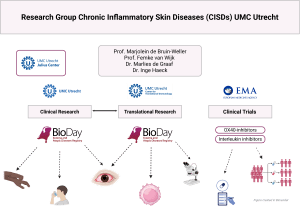To improve the understanding, management, and treatment of chronic inflammatory skin diseases (CISDs) by conducting clinical, translational research and clinical trials.

Chronic inflammatory skin diseases (CISDs) are estimated to affect about 20% of the population worldwide. CISDs, such as atopic dermatitis (AD), psoriasis, and prurigo nodularis (PN), are among the most frequent chronic inflammatory skin diseases. CISDs can develop at any age, affecting both children and adults. Most people have a complex interplay between a dysregulated immune system, genetic disproportion, environmental factors, skin barrier dysfunction and microbial imbalance.
Topical therapy is considered the cornerstone of many inflammatory skin diseases. However, for patients with moderate-to-severe disease, topical treatment is often insufficient. In these patients, broad-acting systemic immunosuppressive drugs such as cyclosporin A and methotrexate can be considered. While some patients experience benefit from these (mostly off-label) systemic drugs, there is a large interpatient variability in clinical response and side effects are commonly reported. In a substantial part of the patients the diseases are refractory to first-line systemic therapy. Due to a better understanding of the immunological pathways involved in the pathogenesis of these diseases, therapeutic agents targeting specific molecular pathways are being developed, including biologics, such as anti-IL-4/IL-13, anti-IL-17, anti-IL-12/IL-23, and TNF-α inhibitors, and small molecules (e.g. Janus kinase inhibitors (JAKi)).
Our department primarily focuses on atopic dermatitis (AD), prurigo nodularis, and urticaria. However, we are actively expanding our research efforts to include other chronic inflammatory skin diseases, such as bullous pemphigoid (BP) and lupus erythematodes (LE). By broadening our knowledge, we aim to improve the understanding and management of these diseases, all of which significantly impact patients both physically and mentally. Our research group is involved in observational clinical and translational research as well as clinical trials. We collaborate with several partners, including the Center for Translational Immunology (Group van Wijk) and the Julius Center of Health Science (Health Economics & Evaluation; Data Science and Biostatistics).

In 2017, we co-founded the BioDay registry together with the UMC Groningen. This multicenter observational registry collects real-world data of both adult and pediatric patients from 4 academic and 16 non-academic hospitals across the Netherlands. We are currently expanding the registry internationally, with the inclusion of several hospitals from Brazil and Belgium. Besides the BioDay registry, the UMC Utrecht has a Biobank for CISD in which blood samples (including serum, plasma, DNA and peripheral blood mononuclear cells), swabs, skin strips and skin biopsies are stored. The BioDay registry and CISD biobank enable further investigation in both real-world clinical research and translational research questions regarding unknown pathomechanisms in CISDs and/or drug-related side effects, but also in evaluating and predicting treatment response.